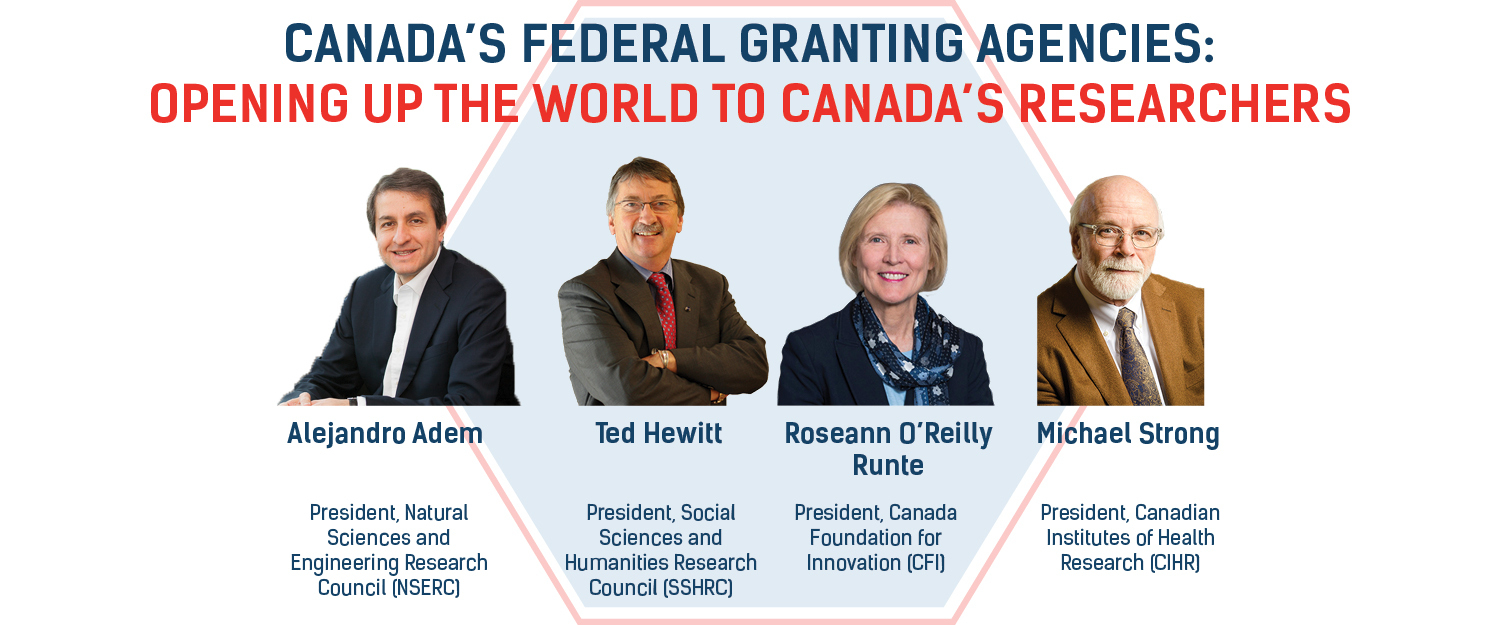Canada’s Federal Granting Agencies: Opening up the World to Canada’s Researchers

Author(s):
Alejandro Adem
Natural Sciences and Engineering Research Council (NSERC)
President
Ted Hewitt
Social Sciences and Humanities Research Council (SSHRC)
President
Roseann O'Reilly Runte
Canadian Foundation for Innovation (CFI)
President
Michael Strong
Canadian Institutes for Health Research (CIHR)
President
Among the many indelible imprints of the global pandemic has been a shared sense that humanity is one interconnected species inhabiting one interconnected planet. As we recover from this global crisis and strive to build a better world moving forward, it is clear that international cooperation and collaboration will be the keys to our prosperity, health, and happiness.
This is certainly the case when it comes to research investment. No single country can meet and overcome the challenges that we face today – nor those that await us in the future – while working in isolation. If this paradigm was not already fully embraced before the global pandemic, it surely will become the predominant ethos of the post-pandemic era of research.
Through the Canada Research Coordinating Committee (CRCC), Canada’s federal granting agencies (the Canadian Institutes of Health Research, the Natural Sciences and Engineering Research Council, the Social Sciences and Humanities Research Council, and the Canada Foundation for Innovation) are working hard to promote international collaboration in research. While these agencies have worked tirelessly throughout the pandemic to ensure that Canadian researchers have the resources necessary to contribute to the international efforts to combat the pandemic, the CRCC has provided an invaluable forum to not only identify pressing research questions, but also to consider carefully how Canadian researchers will collectively emerge from this difficult period of time. First and foremost amongst such considerations is the fact that Canada has an enormous amount of research talent and expertise that we eagerly wish to share with the world. The challenge is to find ways to build meaningful, sustainable international relationships that open up the world to our Canadian researchers and allow the world to benefit from our greatest asset – our people.
Working through the CRCC, we have followed a highly collaborative approach to international engagement that builds on existing relationships developed by the agencies, some of which go back decades. We have also used these opportunities to further promote the importance of equity, diversity, and inclusion as integral components of a strong research enterprise. These engagements include hosting brainstorming sessions with the main science funding agencies around the world, with recent guests including agency heads from the United Kingdom (UKRI), France (CNRS), Germany (DFG), and the United States (NSF). These meetings have provided an opportunity to take stock of existing collaborations while seeking new engagement via a “Team Canada” approach.
The CRCC has also implemented a unique framework through the New Frontiers in Research Fund (NFRF) to support Canada’s research community in a multidisciplinary, international effort to tackle climate change, the existential crisis of our time. In addition to its flagship Exploration and Transformation funding competitions which facilitate global collaboration by welcoming applications from Canadian and international co-applicants, the NFRF’s International stream has also opened the door to Canadian participation in major funding programs outside Canada, most notably Horizon 2020 and Horizon Europe. In addition, the CRCC is developing a competition this year in support of the United Nations Research Roadmap for COVID-19 recovery, as well as a major international call next year on climate change. This latter framework will allow us to engage with agencies around the world to offer significant joint funding that will enable scientists and engineers in Canada to collaborate with international partners on developing the science and technology required to address this global emergency.
Canada has now emerged as a leading voice in marshalling resources and expertise to develop lasting solutions to issues such as climate adaptation, achieving net zero carbon dioxide emissions, and ensuring the availability of clean drinking water – goals that can only be achieved when we agree to work together as a united, global research community. As an example, the CRCC members joined the CFI and the European Union in welcoming over 600 researchers, government officials, facility managers, policy experts, and innovators from around the world to the International Conference on Research Infrastructures – a virtual event broadcasted from Ottawa. The topics covered during the lively exchanges included climate change, food security, clean energy, and poverty. All of these issues were considered in the context of the pandemic, which has spurred a sense of urgency and strong desire to work together across geographic boundaries to address the global challenges that we face.
We often hear it said that the world needs more Canada – and we certainly agree with that premise. But more than that, the world needs more collaboration in general – the uniting of great minds and the sharing of great ideas. Canada’s research communities have much to offer in this context and the CRCC is proud to create the linkages that are connecting Canadian thought leaders with their counterparts across the globe.

